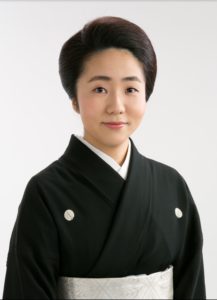 萩岡 松柯(はぎおか しょうか)
萩岡 松柯(はぎおか しょうか)
《山田流箏曲》
第23回(令和元年・2019年度)受賞者
Recipient of the 23rd JTCF Award for 2019
HAGIOKA SHŌKA (Yamada-ryū sōkyoku)
[贈賞理由]
山田流箏曲の基礎をしっかりと身につけ、艶のある美しい声、箏、三弦の表現力に、高い技量を発揮している。また、長唄、河東節、荻江節、胡弓も併修して、古典の担い手としての芸の幅を着実に広げてきた。自身のリサイタルを重ねるいっぽうで、他ジャンルの演奏家との共演や舞踊公演などへの出演も積極的に行い、作曲も手がけている。堅実さと柔軟さをあわせもつ真摯な活動への期待は高く、邦楽の魅力を発信し、未来を担う逸材として評価できる。
[萩岡 松柯 プロフィール]
| 1984年 | 山田流箏曲萩岡派四代目萩岡松韻の長女として生まれる。 幼少より、父に箏の手ほどきを受ける。 |
|---|---|
| 2002年 | 山田流箏・三弦を五代鳥居名美野に師事。長唄三味線を人間国宝の三代杵屋五三郎に、長唄を杵屋五三遊に師事、杵屋五凉の名を許される。 |
| 2007年 | 東京藝術大学音楽学部邦楽科卒業。在学中、常英賞、浄観賞、アカンサス新人賞、同声会新人賞受賞。これより、NHKラジオ「邦楽のひととき」に出演。 |
| 2009年 | 同大学大学院修士課程修了。文化庁芸術団体人材育成支援事業において、胡弓を髙橋翠秋、河東節(浄瑠璃)を人間国宝の山彦節子に師事。山彦みきの名を許される。 |
| 2010年 | 日本伝統文化振興財団邦楽オーディションに合格、記念CDをリリース。山鹿八千代座百周年記念「Ki」に出演。スペインバルセロナ公演にも参加。 |
| 2011年 | これよりNHKラジオ「邦楽百番」に出演。 |
| 2012年 | 国立劇場主催「明日をになう新進の舞踊・邦楽鑑賞会」に出演《桜狩》。 |
| 2013年 | 同大学大学院博士課程修了。音楽博士号(山田流箏曲)取得。在学中学内において第1回~4回「博士りさいたる」を開催。卒業時に中能島賞受賞。 |
| 2014年 | 国立劇場主催邦楽鑑賞会「三曲の会」に初めて出演。同大学音楽学部邦楽科非常勤講師。 |
| 2015年 | 日本女子大学附属高等学校箏曲講座講師。これよりNHKラジオ「邦楽のひととき」に、自身の演奏にても出演。 |
| 「第一回萩岡未貴リサイタル」を開催(平成27年度文化庁芸術祭参加公演)。在英国日本大使館にて、同大使館主催「邦楽の夕べ」に出演。英国王立音楽アカデミーにて、「邦楽ワークショップ」に出演。 | |
| 2016年 | 開智日本橋学園中学校・日本橋女学館高等学校箏曲部講師。 |
| 2017年 | 東京藝術大学附属高等学校非常勤講師。デンマーク王立プレイハウスにて、「日本・デンマーク国交樹立150周年記念行事~箏の響き」に出演。 荻江節の唄を二世荻江寿々に師事、荻江寿未の名を許される。 「第二回萩岡未貴リサイタル」を開催(平成29年度文化庁芸術祭参加公演)。 |
| 2018年 | 正派音楽院講師。 「第三回萩岡未貴リサイタル」を開催(平成30年度文化庁芸術祭参加公演) |
| 2019年 | 芸名を萩岡未貴から(五代)萩岡松柯に改名。 |
(公社)日本三曲協会、山田流箏曲協会、現代邦楽作曲家連盟、箏曲新潮会、古曲会、萩岡會に所属。
演奏会、舞踊公演、NHKラジオ、CD収録等、多数出演。
Reasons for award:
Hagioka Shōka has acquired a thorough mastery of the Yamada school of koto music, and her outstanding abilities are evident in her beautifully lustrous voice and expressive skills on the koto and the shamisen. She has also studied Nagauta, Katō-bushi, Ogie-bushi and kokyū, thereby expanding the range of her artistry as an exponent of the classical repertoire. While presenting her own recitals, she has also actively taken part in performances with musicians from other genres and in dance presentations, in addition to composing her own works. Combining solidity with flexibility, high hopes are being held out for her future musical activity. She is an artist who has the ability to convey the attractions of Japanese traditional music and merits a high assessment as an outstanding musician who will underpin the future of the genre.
Profile of Hagioka Shōka
| 1984: | Born as the eldest daughter of Hagioka Shōin, the fourth head of the Hagioka branch of the Yamada school of koto music. Began studying the koto under the direction of her father from infancy. |
|---|---|
| 2002: | Began studying koto and shamisen in the Yamada school (Yamada-ryū sōkyoku) with Torii Namino V. Also studied Nagauta-shamisen under the National Treasure Kineya Gosaburō III and Nagauta singing under Kineya Gosayū, receiving the stage name Kineya Goryō. |
| 2007: | Graduated from the Department of Japanese Traditional Music in the Faculty of Music at the Tokyo University of the Arts. While a student she was awarded the Jōei Prize, the Jōkan Prize, the Acanthus Newcomers’ Prize and the Dōseikai Newcomers’ Prize. Appeared thereafter on the NHK radio programme featuring traditional music Hōgaku no hitotoki. |
| 2009: | Completed the Master of Music course in the graduate school of the Tokyo University of the Arts. With support from the Agency for Cultural Affairs studied the kokyū with Takahashi Suishū and Katō-bushi (Jōruri) with the National Treasure Yamabiko Setsuko, assuming the stage name Yamabiko Miki. |
| 2010: | Passed the Japanese traditional music audition sponsored by the Japan Traditional Cultures Foundation and released a commemorative CD. Appeared in a concert to commemorate the centenary of the Yamaga Yachiyo Troupe. Participated in a concert in Barcelona. |
| 2011: | Began to appear regularly in the NHK radio traditional music programme Hōgaku hyakuban. |
| 2012: | Appeared in a concert held at the National Theatre in Tokyo featuring up-coming young traditional musicians and dancers, performing the piece Sakura-gari. |
| 2013: | Completed the doctoral course at the Tokyo University of the Arts, gaining the Doctor of Music degree in Yamada school koto music. Gave four doctoral recitals at the university during her period of study. Awarded the Nakanoshima Prize upon graduation. |
| 2014: | Took part for the first time in the Sankyoku no kai concerts of traditional music sponsored by the National Theatre in Tokyo. Appointed part-time lecturer in the Department of Japanese Traditional Music in the Faculty of Music at the Tokyo University of the Arts. |
| 2015: | Appointed lecturer in koto music at the Senior High School attached to Japan Women’s University. Began to appear as a performer in the NHK radio traditional music programme Hōgaku no hitotoki. Presented her first solo recital as part of the 2015 Arts Festival sponsored by the Agency for Cultural Affairs. Took part in a concert of traditional music at the Japanese Embassy in the UK and presented a workshop on Japanese traditional music at the Royal Academy of Music in London. |
| 2016: | Appointed lecturer in koto music at the Kaichi Nihonbashi Gakuen Junior High School and the Nihonbashi Jogakkan Senior High School. |
| 2017: | Appointed part-time lecturer at the Senior High School attached to the Tokyo University of the Arts. Took part in a concert of koto music to commemorate the 150th anniversary of diplomatic relations between Japan and Denmark at the Royal Danish Playhouse in Copenhagen. Began studying Ogie-bushi singing with Ogie Suzu II and was granted the name Ogie Sumi. Presented her second solo recital as part of the 2017 Arts Festival sponsored by the Agency for Cultural Affairs. |
| 2018: | Appointed lecturer at the Seiha College of Music. Presented her third solo recital as part of the 2018 Arts Festival sponsored by the Agency for Cultural Affairs. |
| 2019: | Stage name changed from Hagioka Miki to Hagioka Shōka V. |
Hagioka Shōka is a member of the Japan Sankyoku Association, the Yamada-ryū Sōkyoku Association, the Federation of Composers of Contemporary Japanese Music for Traditional Instruments, the Sōkyoku Shinchō-kai, the Kokyoku-kai and the Hagioka-kai. She has appeared frequently in concerts, dance presentations, on NHK radio and on CD recordings.